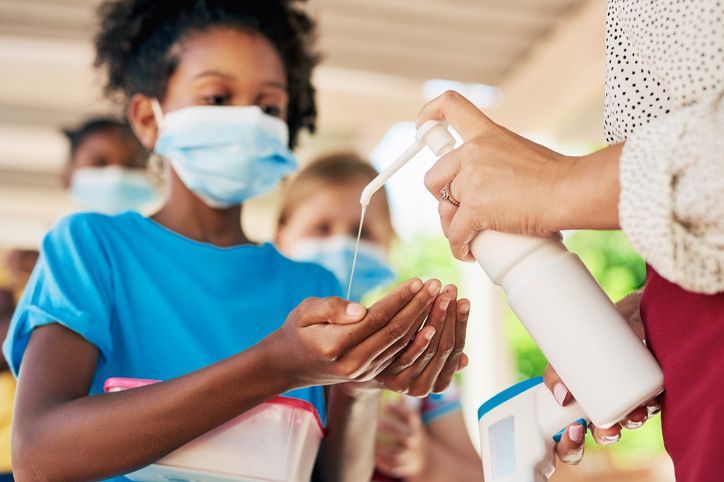After Pfizer’s News Of Promising Vaccine Results, Concerns Linger About Vaccine Equity for Under 12 Year Olds
Source: PeopleImages / Getty
Pfizer announced a significant breakthrough on Monday regarding vaccinating elementary school-age children. New data from the vaccine trial for children under 12 showed the vaccine was safe for children 5-11 and had a similar immune system response as adults.
As a part of the trial, children under 12 were given a modified dosage of the Pfizer COVID-19. In a CNN interview Monday morning, Dr. Sanjay Gupta explained that while “safe” was not the same as efficacy data, it could be enough for the company to pursue an emergency authorization.
“The vaccine itself has been already approved,” Gupta said. “In order to sort of expedite this process, they’re going to likely approve for emergency use authorization with the data that shows that it is safe and it seems to generate these antibodies.”
Good news for parents this morning. For the first time, we have vaccine data for children age 5-11. It is early and still needs to be peer-reviewed, but looks good. “Safe” and a “robust” antibody response.” And, this age group makes up ~9% of the population. @Pfizer pic.twitter.com/wQXV0Y06RY
— Dr. Sanjay Gupta (@drsanjaygupta) September 20, 2021
Gupta also noted that efficacy data collection was an ongoing process. Vaccinating elementary-age children could be a major turning point in the pandemic fight.
Pfizer and its partner BioNTech released results based on a trial of over 2,000 5 to 11-year-olds.
“We are pleased to be able to submit data to regulatory authorities for this group of school-aged children before the start of the winter season,” Dr. Ugur Sahin, CEO and co-founder of BioNTech, said in a statement. “The safety profile and immunogenicity data in children aged 5 to 11 years vaccinated at a lower dose are consistent with those we have observed with our vaccine in other older populations at a higher dose.”
Getting the vaccine approved and available for children under 12 is only half the battle. Vaccine equity concerns continue despite the availability of the vaccine for children.
Available data shows children 12-17 have a lower overall COVID-19 vaccination rate than their adult counterparts. Also, Black and other children of color were less likely to have access to testing by “significantly more likely to be infected,” according to the Kaiser Family Foundation.
Currently, only children aged 12-17 can get vaccinated. And a little more than half of all children under 12 are children of color. That means this age group could have increased challenges to getting vaccinated.
The Kaiser Family Foundation released survey results indicating that parents of Black and Latino children express similar concerns and challenges about vaccination; we’ve seen vaccine equity data for the population 12 and up. Some of the same barriers that are keeping others from getting vaccines also apply to kids.
“Consistent with surveys of adults, Hispanic and Black parents are more likely than White parents to cite concerns that reflect access barriers to vaccination, including not being able to get the vaccine from a trusted place, believing they may have to pay an out-of-pocket cost or having difficulty traveling to a vaccination site,” read the report. (Read the full report here).
According to the CDC, children’s usual vaccine exemption rate is low at 2.5 percent in the 2019-2020 school year. The overwhelming majority of children nationwide, daycare through high school, receive routine vaccinations required by state law. Adding another vaccine to the list shouldn’t be a huge deal.
Yet, most states do not have a COVID-19 vaccine requirement for students attending school. The possibility of all school-age children being covered, along with new safety data, could change some minds.
Several schools have begun trying a new testing protocol that doesn’t require quarantining kids based on exposure only if they otherwise comply with school mask protocols and social distancing.
Quarantining exposed kids, especially if they are in a school with masking requirements is disruptive to education and working parents. This approach should be supported with resources to implement a “test and stay” strategy via @NYTimes https://t.co/3zpzAZLxEY
— Carlos del Rio (@CarlosdelRio7) September 19, 2021
Pfizer is still testing the safety of children under the age of 5. Children as young as six months have been included in the Phase 1/2/3 Trial on children. Data for babies and toddlers could be available soon.
See Also:
Anti-Vax Special Ed Staffer Thinks Blackface Is The Best Way To Oppose Vaccine Mandate
Mississippi Governor Deflects From Having 2nd Highest COVID-19 Death Rate In The World
[ione_media_gallery id=”3917798″ overlay=”true”]

